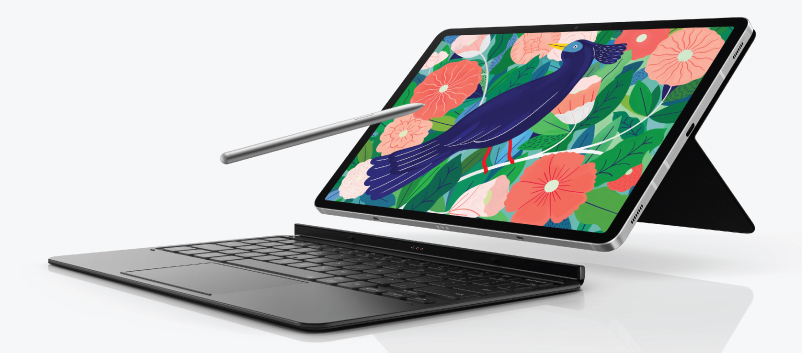Enterprise Mobility & the Connected Worker Blog
Further Enterprise Ambitions Hinted at Samsung’s Galaxy Unpacked
by Pat Nolan | 08/13/2020
Samsung’s 2020 Galaxy Unpacked, a virtual product reveal event, took place last week. Leaders from the technology giant’s mobile teams spent over an hour unveiling five new products: the Note20 smartphone and Note20 Ultra phablet, the Tab S7 / S7+ tablet, the Watch3 smartwatch and Buds Live wireless earbuds. Although the product announcements at this event were more so aimed at consumers (especially compared to some of Samsung’s recent frontline-focused releases like the rugged Galaxy XCover Pro, announced this January) the company’s enterprise environment ambitions for the Galaxy ecosystem were clear. One of the most prominent themes of the event was the dynamic between work and play; lines and language like “the power to work, the power to play” and the ability to “work hard, play hard” were consistently used throughout each presentation.
A couple of Samsung’s new products are truly consumer devices that feel out of place for enterprise mobility consideration in this post. The Watch3 smartwatch and Buds Live earbuds, while impressive and innovative within their respective product categories, align more with the “play” side of things. The other three, however, are noteworthy in the “work” context. The 6.7” Note20 and 6.9” Note20 Ultra, to start, are built with Corning Gorilla Glass Victus, the strongest ever on a smartphone, according to Samsung. To boot, the handheld devices have doubled their display refresh rate from 60 Hz to 120 Hz, which increases responsiveness for touchscreen and S Pen stylus interactions, and have the fastest processors in the Galaxy series to date. Their battery life and performance, routinely top selection criteria for enterprise IT decision makers, are also notable. The Note20 and Note20 Ultra’s all-day intelligent batteries have a 4500mAh capacity and can fully charge in about an hour.
Figure 1: Galaxy Note20 with S Pen in Mystic Bronze

The 11” and 12.4” Tab S7 and Tab S7+ 2-in-1 tablets also boast a 120 Hz refresh rate and have CPU speeds 30% faster than their predecessors. The attachable keyboard has been enhanced with a larger trackpad and shortcut keys to replicate a full PC experience. In the name of increased productivity, these 2-in-1s can run up to three apps simultaneously in a drag-and-drop, click-to-fit interface. For both the Note20 series and these new tablets, the S Pen stylus has been improved with predictive writing to fix latency issues and reduce responsiveness from 59ms to 9ms. As a result of an expanded partnership between Microsoft and Samsung, the devices announced at Galaxy Unpacked feature new productivity enhancements. The new capabilities let users integrate, sync and access a variety of apps and services across Microsoft 365, Windows 10 and Android-based Galaxy environments for seamless productivity experiences; for instance, you can take calls, check messages and access mobile apps right from a Windows 10 PC.
Figure 2: Galaxy Tab S7 in Mystic Silver with S Pen and Attachable Keyboard

The performance, productivity and durability improvements among these devices hint at their business use case aspirations. The fact that, in addition to being 5G-enabled, they come loaded with Samsung’s end-to-end security solution, Knox, and its display mirroring/desktop extending DeX solution, it is likely that their embrace by enterprise customers will expand. What’s more, at Unpacked, it was announced that DeX is now wireless; one of the solution’s primary vulnerabilities and points of failure in its leading business application, public safety in-vehicle computing, has been the required cable connectivity. DeX is useful for workers that have different screen size requirements and preferences depending on the task they are doing, and the wireless enablement is a step in the right direction for its feasibility at scale.
The key takeaway from Galaxy Unpacked is that, in addition to its truly rugged releases like the XCover Pro, Samsung is putting in the effort to create an extensive and diverse Galaxy ecosystem that increasingly appeals to business customers. Last month, the company even announced its upcoming AppStack offering, a cloud-based software marketplace targeting SMBs’ need for: better access to productivity and collaboration tools, IT infrastructure simplification and SaaS options. This all furthers what VDC’s conversations with enterprise mobility and technology community leaders have suggested, that Samsung is a growing B2B market competitor.
Validating the resources and effort Samsung has put in on this front, a software vendor that develops omni-channel fulfillment solutions named them as the most streamlined tech partner experience that the ISV has had in a recent in-depth interview.
View the 2020 Enterprise Mobility and the Connected Worker Research Outline to learn more